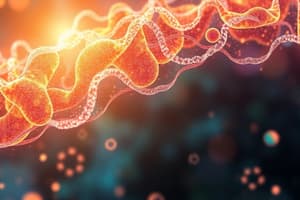Podcast
Questions and Answers
Which electrolytes are primarily involved in maintaining electrical neutrality in the cells?
Which electrolytes are primarily involved in maintaining electrical neutrality in the cells?
- Mg, Ca
- Ca, Zn
- Na, K, Cl (correct)
- HCO3, K
What role does water play in the body's physiological processes?
What role does water play in the body's physiological processes?
Transport of nutrients, determination of cell volume, removal of waste, temperature regulation, cushioning joints, protection from shock, and digestion.
The majority of total body water is located in the __________ compartment.
The majority of total body water is located in the __________ compartment.
intracellular
The body regulates a constant amount of water which is 60% of total body weight.
The body regulates a constant amount of water which is 60% of total body weight.
Which mnemonic is used to remember the electrolytes involved in myocardial rhythm and contractility?
Which mnemonic is used to remember the electrolytes involved in myocardial rhythm and contractility?
Match the following compartments with their descriptions:
Match the following compartments with their descriptions:
What is Gibbs-Donnan equilibrium?
What is Gibbs-Donnan equilibrium?
Study Notes
Gibbs-Donnan Equilibrium
- Separated solutions by a semipermeable membrane establish equilibrium, distributing all ions across body fluid compartments.
Water
- Essential for physiological processes including nutrient transport, cell volume determination, waste removal, temperature regulation, joint cushioning, tissue and organ protection, food digestion, and weight regulation.
- Compounds in the body must interact with an aqueous medium for proper functioning.
- Body maintains a consistent water level, comprising 60% of the body weight.
- Found in both intracellular and extracellular compartments.
- Intracellular water: Makes up the majority of total body water (60% or approximately 2/3).
- Extracellular water: Accounts for 40% or 1/3 of total body water.
Electrolytes
- Electrolytes maintain electrical neutrality within cells.
- Involved in blood volume and osmotic regulation.
- Contribute to nerve and muscle action potential generation and conduction.
- Regulate myocardial rhythm and contractility.
- Essential for blood coagulation.
- Facilitate ATP production from glucose.
- Act as cofactors in enzyme activation.
- Maintain acid-base balance.
- Mnemonics:
- NaKO (view Cl as “O”) for sodium, potassium, and chloride.
- Mag Ca-Kapatid for magnesium, calcium, and potassium.
- Mag Ca-Zin for magnesium, calcium, and zinc.
Blood Volume Regulation
- Occurs through the regulation of water and sodium levels, which are closely interconnected.
- Sodium is responsible for maintaining blood volume because it attracts water.
- Sodium imbalance directly affects blood volume, impacting blood pressure and circulation.
Studying That Suits You
Use AI to generate personalized quizzes and flashcards to suit your learning preferences.
Related Documents
Description
This quiz explores the concepts of Gibbs-Donnan equilibrium and the crucial roles of water and electrolytes in the human body. Understand how these elements interact to maintain physiological processes and balance within bodily compartments. Dive into the importance of water distribution and electrolyte function in health and bodily functions.




